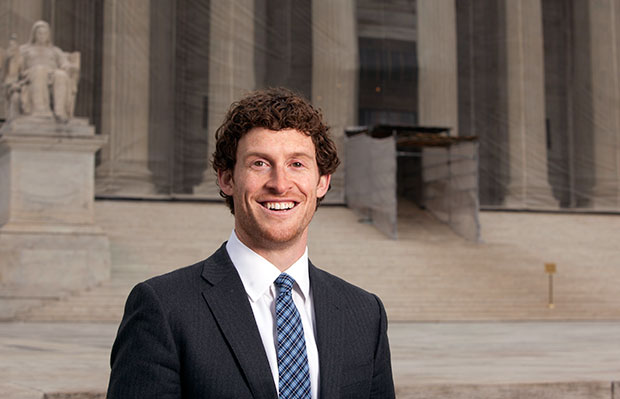
Judson Littleton, ’08, is one of four law clerks to Chief Justice John G. Roberts Jr. for the October 2013 Term.
Not one to shy away from hard work, competition and intellectual challenges, Judson Littleton, ’08, is the latest University of Texas School of Law alumnus to achieve the most prestigious credential in American law: a clerkship at the Supreme Court of the United States. Littleton, who started the new job in July, is one of four law clerks to Chief Justice John G. Roberts Jr. for the October 2013 Term.
“I feel so fortunate to have this tremendous opportunity to work with and learn from the Chief Justice of the United States for a year, and will try to absorb every last ounce of wisdom from him that I can during that time,” Littleton said.
Before beginning his clerkship, Littleton was a trial attorney working in the civil division of the Department of Justice. From 2009 to 2010, he was a Bristow Fellow at the U.S. Office of the Solicitor General. Prior to that, he was a law clerk to the Honorable A. Raymond Randolph on the U.S. Court of Appeals for the D.C. Circuit. Littleton is a native Texan, born and raised in Dallas.
A UT Law education has prepared many graduates for Supreme Court clerkships — 36 in all — many of them quite recently. Several of Littleton’s classmates, including William Peterson, ’08; Scott Keller, ’07; and Ryan Newman, ’07, recently completed clerkships with Justice Clarence Thomas, Justice Anthony Kennedy and Justice Samuel Alito, respectively.
“Those are pretty big footsteps to follow, but it is a testament to their success, and more fundamentally, to the quality of preparation and training provided by the law school, that Justices continue to look to UT Law grads when hiring their clerks,” Littleton said.
UT Law provided Littleton the tools to forge a path to the Supreme Court, he said, specifically mentioning classes like Professor Lynn Blais’ Administrative Law, which prepared him for legal work at the federal level, and participation in the Supreme Court Clinic with Professors Michael Sturley and Blais, who both clerked at the U.S. Supreme Court.
“It was a tremendous experience as a law student to get to work on real cases before the Court with not only those two terrific professors, but also one of the absolute best advocates appearing before the Court today, David Frederick,” Littleton said. Frederick also clerked for the Court and is a UT Law grad, class of ’89.
When pressed to pick a favorite class though, Littleton said it was a First Amendment seminar with Professor David Anderson. The seminar focused on the intersection — and often an apparent conflict — between national security and the values protected by the First Amendment, he said.
“A J.D. from UT Law opens any door in the country,” Littleton said. “And I can’t imagine a more supportive faculty and alumni body to have in your corner as a young law school graduate.”
“We do everything we can to support our alums who apply [for Supreme Court clerkships],” said Professor Alex Wilson Albright, UT Law’s faculty adviser for judicial clerkships. “We have several faculty members (and Dean Farnsworth) who have clerked for the Supreme Court, and they help us advise our applicants. We also put them in contact with our alums who have clerked for Justices. Being well informed and prepared is vital to a successful application.”
Something Littleton said his years in the Solicitor General’s Office and the school’s Supreme Court Clinic didn’t fully prepare him for: “Just how exhilarating it is to come to work here every day,” he said after his first month on the new job.
“The Chief Justice is an extraordinarily good writer, and I very much hope to improve my own writing by observing and working closely with him,” Littleton said. He’s also looking forward to attending oral arguments, meeting the other Justices and getting to know the 38 other law clerks.
U.S. Supreme Court clerkships are difficult to obtain, highly coveted and can yield a lot of career opportunities for lawyers. Littleton remains focused on the Term and on keeping his future options open.
“I’ve been fortunate enough to gain some wonderful experience as a government lawyer, and I think it will be nice to step back and see what opportunities present themselves after this year and down the road,” Littleton said.
— Julien Devereux and Samantha Youngblood
